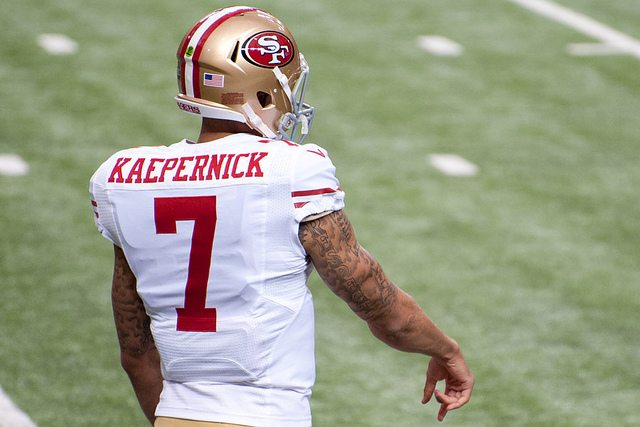A sport divided
On September 1 2016, Colin Kaepernick knelt during the Star Spangled Banner for the first time.
A small movement, in an inauspicious fixture: a routine 49ers pre-season game. Yet the shockwaves that decision sent out across America continue to reverberate around a nation that is currently divided to an unprecedented level. There are huge schisms in politics, public life, culture and now, inevitably, sport.
Not that one would know it, if they happened to glance at Sports Illustrated’s October issue. ‘Sports United’, it proudly proclaimed – a statement as glaringly inaccurate as is conceivable – accompanied by an array of figures linking arms, most amusingly so the Commissioner of the NFL, Roger Goodell, and Shahid Khan, owner of the Jacksonville Jaguars. That’s noted civil rights campaigner Roger Goodell, and Shahid Khan – $1 million donor to the Trump Presidential Campaign.
Of course one individual was conspicuous by their absence – and it was the man who no NFL team will touch, despite their supposed unity. It’s the man who does feature on our last back page, and whose message has been cynically and utterly sanitised in the past few weeks.
His action was not a comment on free speech. He knelt out of anger, pain and disillusionment
Colin Kaepernick was not protesting Donald Trump – who has a long and colourful history with the NFL. He was not defending the honour of the NFL’s players, those ‘sons of bitches’. His action was not a comment on free speech. He knelt out of anger, pain and disillusionment – anger at the persistent persecution of African-Americans at the hands of a trigger happy and racially imbalanced police force, pained by the continued legacies of a nation built amongst the backdrop of slavery and Jim Crow, and disillusionment with the flag that Americans are indoctrinated with worshipping from almost the moment they first leave the hospital.
‘I am not going to stand up to show pride in a flag for a country that oppresses black people and people of colour. To me, this is bigger than football and it would be selfish on my part to look the other way. There are bodies in the street and people…getting away with murder.’ Those were Colin Kaepernick’s first words on his protest, and it is a far cry from some of the empty statements released by NFL teams and their multi-billionaire, predominantly white owners.
Only the Seattle Seahawks’ Peter McLoughlin touched vaguely upon the actual issues at hand
Take Chicago Bears’ Chairman George McCaskey’s eulogy to the ‘the greatest country in the world’ which completely missed the point, focusing on ‘the liberties it was founded upon and the freedom to express oneself’ (incidentally, George Washington, Benjamin Franklin and Thomas Jefferson, amongst other founding fathers, were all slaveholders). That was far from the most egregious of statements, with many missing the mark even more notably, and a few (some of them Trump donors) pretending nothing was happening altogether. Only the Seattle Seahawks’ Peter McLoughlin touched vaguely upon the actual issues at hand, commendably citing the ‘existing racial…divides in our country.’
Although many more players protested during the anthem in light of Trump’s comment than any other time in history, with most of them undoubtedly with the right issues at the forefront of their motivations for doing so, the numbers protesting the following game-week was noticeably fewer – further speaking to their lack of connection with the continuing underlying issues. Disappointing too, was the racial make up of those kneeling – the vast, vast majority of white players choosing not to. Kansas City Chiefs’ Tight End Travis Kelce was a notable high-profile exception, but was a worryingly rare example.
No, sports is not united. Kaepernick is still without a team, has recently been voted the most disliked player in the NFL and protesting players were booed at several grounds. As many as 38% of Americans agree that Trump is right, and that players who protest during the anthem should be fired for doing so. How many more think they are simply wrong, disrespectful, and the problems they are highlighting do not exist?
Like it or not, racial injustice has become an issue that is intrinsically connected to sport
Longing for an ability to watch sport without the interference of politics is understandable. Whether such a time truly existed, bearing in mind the rich history of sporting protest, is debatable – but politics in 2017 is inescapable; actors and musicians are vocal and opinionated, and even the President of the United States of America is a Twitter troll. Granted, I understand that for many Americans it would simply be nice to watch a Football match on their weekend without thinking about it. In many ways I’d rather be writing an article about the Chiefs’ perfect start to the season.
Like it or not, racial injustice has become an issue that is intrinsically connected to sport, especially American Football. At a time when Seattle defensive end Michael Bennett alleges he was the victim of racial profiling and disproportionate violence at the hands of the Las Vegas police force, how could it not be?
It’s easy to close your eyes to injustices, and suffering. But at this point, to want to supress the protest – even if not from a place of political motivation – is to want to supress the message from being spread. I’m reminded of the famous Jon Stewart quote, that applies so perfectly: ‘Race is there and is a constant. You’re tired of hearing about it? Imagine how ******* exhausting it is living it.’

Comments